June 29, 2018
Edited by David Sanders
Specimen Days
1798—Giacomo Leopardi, Italian poet (d. 1837), is born.
1893—Antoon Schweigmann, Dutch religious poet/resistance fighter
1900—Antoine de Saint-Exupéry, French writer, poet and pioneering aviator (The Little Prince), born in Lyon, France (d. 1944), is born.
1905—Manuel Altolaguirre, Spanish poet/publisher (La lenta libertad), is born.
1922—Vasko Popa, Yugoslavia/Serbian poet (Heaven is a Side Issue), is born.
1977—Oleg Korenfeld, Russian-born American poet, is born.
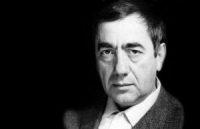
It moves
With the shameless march of time
It holds all
In its passionate
Internal embrace
A smooth white innocent torso
It smiles with the eyebrow of the moon
—from “The Quartz Pebble” by Vasko Popa translated by Anne Pennington
“With the shameless march of time / It holds all / In its passionate / Internal embrace” – Vasko Popa
World Poetry
Ivan Drach, Prominent Ukrainian Poet, Dies at 81
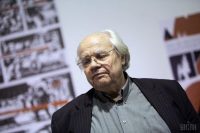
Prominent Ukrainian poet Ivan Drach died after a serious illness in Feofaniya Clinical Hospital in Kyiv on Tuesday, June 19. Read also Legendary Ukrainian poet Borys Oliynyk dies "He died in the morning. Hence, he did not live much. He was 81 years old. The soul of the great poet, filmmaker and public figure is flying away from us…," film critic Sergiy Trymbach wrote on Facebook.
Renowned Hungarian Poet Sándor Kányádi, Artist of the Nation, Has Died at Age 90
Ethnic Hungarian poet and translator Sándor Kányádi was born on 10 May, 1929 in Nagygalambfalva (in Romanian Porumbeni), a small village in Hargitha County, Transylvania. He moved to Kolozsvár (Cluj-Napoca) in 1950. He graduated from Bolyai University as a Hungarian language and literature teacher. His first poems were published in 1955. During his active years he was the editor and frequent contributor to several literary and children’s magazines. He has been active in political issues in his life, as shown in his numerous works relating to the ongoing oppression of Transylvania’s Hungarian minority.
Prominent Ukrainian poet Ivan Drach died after a serious illness in Feofaniya Clinical Hospital in Kyiv on Tuesday, June 19.
Recent Reviews
Blending Out: Oceanic by Aimee Nezhukumatathil
by Jeannine Hall Gailey
I’ve been following Aimee Nezhukumatathil’s career since her first book, and her latest, Oceanic(released this April from Copper Canyon Press), is her strongest, most confident writing yet. It’s been seven years since her last book of poems, Lucky Fish (Tupelo Press, 2011), and I believe she channeled her energy during that time into this powerful volume packed with intimate details of the creatures of the earth, as well as the passions of the speaker’s (and presumably the writer’s) life. Nezhukumatatil engages with wide-ranging subject matter—pop music, art, science, mythology, and even disturbing topics like child trafficking—in a variety of forms. Despite its title, Oceanic is much more than a love letter to the ocean. Full of poems that are passionate about the environment without being preachy, that beautifully name and describe the natural world, and that honor self, love, and family, Oceanic is a celebration of nature and of life itself.
An ‘I’ For An ‘I’: the Vanishing Self in Lyric Poetry
by Chrissy Williams
Sophie Collins’s début collection Who is Mary Sue? assembles many different types of text – poetry (both lineated and prose poetry), prose (part essay, part notation), quotations, and an image – in a thought-provoking exploration of what the ‘self’ is in poetry.
Making the Language Strange, as Only Poetry Can Do
by Jane Gregory
The aims of the Language (or L=A=N=G=U=A=G=E) poetry movement that emerged in the late 1960s were largely political: Rational syntax, these poets believed, was a tool of oppression. So they rejected rational syntax, breaking the language through tactics like parataxis — essentially a system of non sequitur, where sentences create meaning through juxtaposition, but refuse to accrue into anything resembling a linear argument. The content of Language poetry may not be overtly political; instead, Language poets sought to advance a leftist agenda through radical forms.
An Adolescence of Skateboards, Fistfights and Sexual Yearning, Turned Into Pure Poetry
by David Kirby
My first thought about the poems in Matthew Dickman’s new collection, “Wonderland,” was: Why doesn’t every poet write this way? That doesn’t mean that I want every poet to write irregular lines about his or her childhood, just that I wish others wrote with Dickman’s clarity and ability to engage.
A Hard Childhood Compressed Into Poetry, With Concision and Heat
by Stephanie Burt
Hieu Minh Nguyen begins his concise and unsettling second book of poems with an apology, or an accusation: “It seems important to mention all the things / that went wrong.” And so many things have gone wrong, in Nguyen’s past and in the history of his family. His mother, who came to America from Vietnam, could not prevent his father, also Vietnamese, from abusing them both, emotionally and physically. As a child, he also faced racial hatred: “Boys … chucked rocks at our heads.” The young poet ran away from home. A grade school teacher repeatedly “molested” him, “my naked shape molting green in her hands. … She would find me at Champ’s playground. Even in the summer.” His best friend (whom she did not molest) died very young.
Sophie Collins’s début collection Who is Mary Sue? assembles many different types of text – poetry, prose, quotations, and image.
Broadsides
Curating Slatterns: Painting, Poetry and the Female Gaze
by Kathryn Maris
I never wanted to be a painter, but I did want to be Frank O’Hara. His curatorial job at The Museum of Modern Art and lunchtime walks, his lively antics with a gifted circle of friends and lovers, were described by Kenneth Koch in an undergraduate class I attended at Columbia University. Koch, who had been a close friend of O’Hara, was a funny, spirited, sceptical, impish and occasionally spiky professor. When I wrote a paper on my then-favourite poet, Richard Wilbur, my A- was accompanied by the comment, ‘I still don’t understand what Wilbur does that you think is so good’.
Yrsa Daley-Ward Breaks Out of the Instapoetry Pack with Her Memoir “The Terrible”
by Katy Waldman
Has poetry taken over Instagram, or has Instagram taken over poetry? A coterie of creators, drawn to the image-sharing platform as a lyric technology, is helping poetry—or at least, Instapoetry—find a wider, more diverse audience. Their queen, Rupi Kaur, types spare, lowercase lines over stylized photographs. Her work, stark and minimalist, is nevertheless profuse when it comes to followers (2.7 million) and sales. (The collections “Milk and Honey” and “The Sun and Her Flowers” were New York Times best-sellers). Kaur, a Punjabi-Canadian in her twenties, is a catalyst for angst about a genre of verse that some view as trite, materialistic, soulless.
Has poetry taken over Instagram, or has Instagram taken over poetry?
Drafts & Fragments
Poet Richard Blanco Celebrates Pride Month And Introduces 'Zip Odes'
By Amanda McGowan
In the latest edition of "Village Voice," Boston Public Radio's recurring conversation about how poetry can help us understand the news of the day, poet Richard Blanco shared his favorite poems celebrating Pride Month. He also introduced "Zip Odes," a call to submit poems about your neighborhood (see below for details.) Blanco shared poems about LGBTQ relationships, including his own poem "Killing Mark." He said the poem "really, in a way, speaks to [the fact] that love is love, and marriage is marriage, and straight folks don't have the corner on dysfunctional relationships.” Blanco also shared a poem by Adrienne Rich, one of America's most prominent lesbian poets. The poem doesn't address LGBTQ themes specifically, but sees the world with a sensitivity that Blanco said is a hallmark of many LGBTQ writers.
Hope, Despair in Poetry by Immigrant Children in US Lockup

The young immigrants held in prison-like conditions at a juvenile detention center in the mountains of Virginia express despair. Some cling to pleasant memories from home. For a select few, there is hope. For a handful of immigrants who came to the U.S. from Central America — many as unaccompanied minors — poetry has given them a chance to tell the world both about their journeys north — and through the byzantine immigration system.
Sylvia Plath's Pulitzer Prize in Poetry to be Auctioned
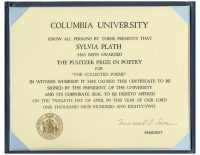
The Pulitzer Prize in Poetry awarded to Sylvia Plath posthumously in 1982, will be auctioned by Nate D. Sanders Auctions on June 28, 2018. Plath was awarded the Pulitzer Prize in Poetry for “The Collected Poems,” which was edited by her English poet husband, Ted Hughes. Hughes was presented the Pulitzer Prize on behalf of his late wife. The certificate was inherited by Plath and Hughes’ daughter Frieda Hughes.
Sylvia Plath’s Pulitzer Prize is going to be auctioned off.
Poetry In the News
Donald Hall, a Giant of American Poetry, Dies at 89

Donald Hall, one of the last major American poets of his generation, died Saturday night at Eagle Pond Farm in Wilmot, where he hayed with his grandfather during boyhood summers and later cultivated a writer’s life. Hall was 89 years old and had been in declining health. He was a literary dynamo, writing poetry, memoir, criticism, magazine articles, plays, short stories and children’s books. “I worked on Christmas Day in order to be able to brag that I worked on Christmas Day,” he told one of his last interviewers. He wrote almost to the end of a career of more than 60 years.
‘I am confused and afraid’: Teen Wrote Haunting Poem Two Years before Police Killed Him
“I see mothers bury their sons. I want my mom to never feel that pain.” Two years ago, Antwon Rose wrote those prescient lines in a poem for his 10th grade honors English class. He titled it, “I am not what you think.” He refused to be “just a statistic,” the African-American teenager wrote.
North Carolina Gets First African-American Poet Laureate
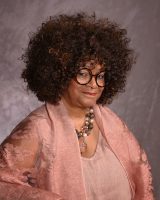
Gov. Roy Cooper has named North Carolina's first African-American poet laureate. Cooper announced Thursday that Jaki Shelton Green will succeed Shelby Stephenson, who was named the state's poet laureate in February 2015. Green also is the third woman to become the state's ambassador for poetry and the spoken word. She will be installed during a public celebration later this summer. The Orange County native has been active in the state's literary and teaching community for more than 40 years. She has penned eight books of poetry, co-edited two poetry anthologies and written one play. She won the North Carolina Award for Literature in 2013 and was inducted into the North Carolina Literary Hall of Fame in 2014.
Gov. Roy Cooper has named North Carolina’s first African-American poet laureate: Jaki Shelton Green.
New Books
Baby Grand by Louise Schneider
[Paperback] Peninsula Road Press, 54 pp., $12.95

The poems in Baby Grand both mourn and praise, and weave these twin impulses into haunting beauty. Everywhere Louise Schneider looks, and her gaze is wide, she finds both loss and renewal. In the title poem, a young pianist receives an instrument already marked by age, "the way a body collects its injuries, teeth marks, chips, and sun fade." To risk everything, as these elegant subtle poems remind us, is to be human.
Anatomy of an Injury by Myna Wallin
[Paperback] Inanna Publications, 100 pp., $18.95
Bringing together the themes of death, of gender and sexuality, the poet creates a speaker whose language and experience, linked from poem to poem, reflects the true complexity of a woman's perspective. Death is a prevalent theme; anxiety, fear and paranoia simmer throughout the poems. Regret, too, is a recurrent theme, as previous experience defines us even by its absence. The societal construct of womanhood, questions of aging, and female stereotypes are opportunities for an analysis of women's roles and the speaker's need to subvert modern ideals of femininity and sexuality. The poems often employ satire or self-parody and wry humour to suggest that a woman's understanding of her options in the twenty-first century, in light of the many waves of feminism, is always in flux and always challenging.
Quarrels by Eve Joseph
[Paperback] Anvil Press, 96 pp., $18.00

The poems in this collection reach for something other than truth, the marvelous. Leaves fall out of coat sleeves, Gandhi swims in Burrard Inlet. The poems are like empty coats from which the inhabitants have recently escaped, leaving behind images as clues to their identity. There are leaps between logics within the poems, and it is in these illogical spaces where everything comes together, like the uplift of the conductor's hand to begin a piece of music where, as Arvo Part put it, the potential of the whole exists.
Rechelesse Pratticque by Karen Mac Cormack
[Paperback] Chax Press, 76 pp., $25.00
"Relevant disturbance," "weigh your words carefully," and weigh is one of the things Mac Cormack does so well in this melange of poetry and visual poetry by one of the most innovative of America's (and formerly Canada's) poets. This is courageous, visionary work.
Shell Game by Jordan Davis
[Paperback] Edge Books, 144 pp., $18.00
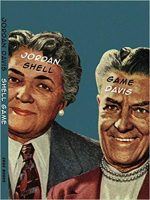
The first collection in fifteen years from a poet whose first book Stephanie Burt called "very personal, very appealing," Shell Game by Jordan Davis presents a series of puzzles of feeling and mazes of history where the person speaking disappears into the world, and vice versa, without warning. Starting against the backdrop of New York in 2001 and working back to the words that came into the English language during World War II, Jordan Davis's second book teleports to Turkey in the middle of the century in a series of poems reimagining the work of Orhan Veli Kanik as a New York School poet, then returns to reflect on the precarious present in which everything is at incredible risk, and trying to laugh about it.
The poems in Baby Grand both mourn and praise, and weave these twin impulses into haunting beauty.
Correspondences
Interview with Danez Smith
by Sandeep Parmar
At the end of January 2018 I met Danez Smith in Manchester, before their event at the Anthony Burgess Centre that evening. Smith’s latest collection, Don't Call Us Dead, had just been published in the UK, having already appeared in the US to much acclaim, where it was shortlisted for the National Book Award in Poetry. But Smith’s work (their latest and their 2014 debut {Insert} Boy) as well as two pamphlets of poems (Hands On Your Knees and Black Movie) has not only been praised by reviewers and critics. Smith’s reputation is founded initially in live performance; their transatlantic visibility precedes them through a variety of online and print platforms as well as a huge social media following, all of which has created a community of poets and readers, something central to both their writing and live performance.
The Black Pages, the White Script, the Maps, the Constellations: Talking to Caroline Bergvall
by Andy Fitch
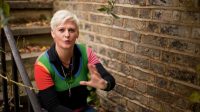
How to bring decades of embodied, socially embedded performance practice into the poetics and the politics of the printed book? How, then, might this platform of the physical book allow for the most sensitive, most incisive, most acute aesthetics/ethics of representing strangers’ suffering? When I want to ask such questions, I pose them to Caroline Bergvall. This present conversation (transcribed by Phoebe Kaufman) focuses on Bergvall’s Meddle English and Drift. Bergvall is a writer, artist, and vocal performer of French-Norwegian origins, now based in London (and with substantial ties to North American poetry communities).
Envoi: Editor’s Notes
Lessons from the Past: Donald Hall
"There is poetry as a form of behavior, poetry as a form of political activism and poetry having the right ideas and correct political ideas – even ideas that I'm in favor of – poetry having populist ideas and so on. That has no relationship to George Herbert and for that matter to T.S. Eliot or William Butler Yeats. I just think that poetry comes out of many things but one of the things it must come out of is other poetry. I remember once Seamus Heaney and I were talking about American poetry. He was praising it to a degree but 'it lacks song' he said. The song in Irish poetry is the source, much more than most English poetry. But the lack of song is partly a lack of that sense of literary layering, of going back through the song that rises out of Wyatt and Chaucer. It goes through Dickinson and Whitman too. I think we detach from England at some point but I feel that lack. But then I feel the strong presence of it in certain American poets, in Galway Kinnell, for instance, and many others. I like this period of American poetry."
—from an interview with Donald Hall by Michael O'Siadhail in Poetry Ireland Review Issue 28